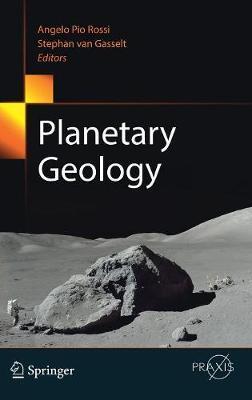Planetary Geology

Planetary Geology
Planetary research today is a strongly multidisciplinary endeavor with efforts coming from engineering and natural sciences. Key focal areas of study are the solid surfaces found in our Solar System. Some have a direct interaction with the interplanetary medium and others have dynamic atmospheres. In any of those cases, the geological records of those surfaces (and sub-surfaces) are key to understanding the Solar System as a whole: its evolution and the planetary perspective of our own planet.
This book has a modular structure and is divided into 4 sections comprising 15 chapters in total. Each section builds upon the previous one but is also self-standing. The sections are:
Methods and tools
Processes and Sources
Integration and Geological Syntheses
Frontiers
The latter covers the far-reaching broad topics of exobiology, early life, extreme environments and planetary resources, all areas where major advancements are expected in the forthcoming decades and both key to human exploration of the Solar System.
The target readership includes advanced undergraduate students in geoscience-related topics with no specific planetary science knowledge; undergraduates in other natural science domains (e.g. physics, astronomy, biology or chemistry); graduates in engineering and space systems design who want to complement their knowledge in planetary science.
The authors' backgrounds span a broad range of topics and disciplines: rooted in Earth geoscience, their expertise covers remote sensing and cartography, field mapping, impact cratering, volcanology and tectonics, sedimentology and stratigraphy exobiology and life in extreme environments, planetary resources and
PRP: 897.44 Lei
Acesta este Pretul Recomandat de Producator. Pretul de vanzare al produsului este afisat mai jos.
807.70Lei
807.70Lei
897.44 LeiIndisponibil
Descrierea produsului
Planetary research today is a strongly multidisciplinary endeavor with efforts coming from engineering and natural sciences. Key focal areas of study are the solid surfaces found in our Solar System. Some have a direct interaction with the interplanetary medium and others have dynamic atmospheres. In any of those cases, the geological records of those surfaces (and sub-surfaces) are key to understanding the Solar System as a whole: its evolution and the planetary perspective of our own planet.
This book has a modular structure and is divided into 4 sections comprising 15 chapters in total. Each section builds upon the previous one but is also self-standing. The sections are:
Methods and tools
Processes and Sources
Integration and Geological Syntheses
Frontiers
The latter covers the far-reaching broad topics of exobiology, early life, extreme environments and planetary resources, all areas where major advancements are expected in the forthcoming decades and both key to human exploration of the Solar System.
The target readership includes advanced undergraduate students in geoscience-related topics with no specific planetary science knowledge; undergraduates in other natural science domains (e.g. physics, astronomy, biology or chemistry); graduates in engineering and space systems design who want to complement their knowledge in planetary science.
The authors' backgrounds span a broad range of topics and disciplines: rooted in Earth geoscience, their expertise covers remote sensing and cartography, field mapping, impact cratering, volcanology and tectonics, sedimentology and stratigraphy exobiology and life in extreme environments, planetary resources and
Detaliile produsului








